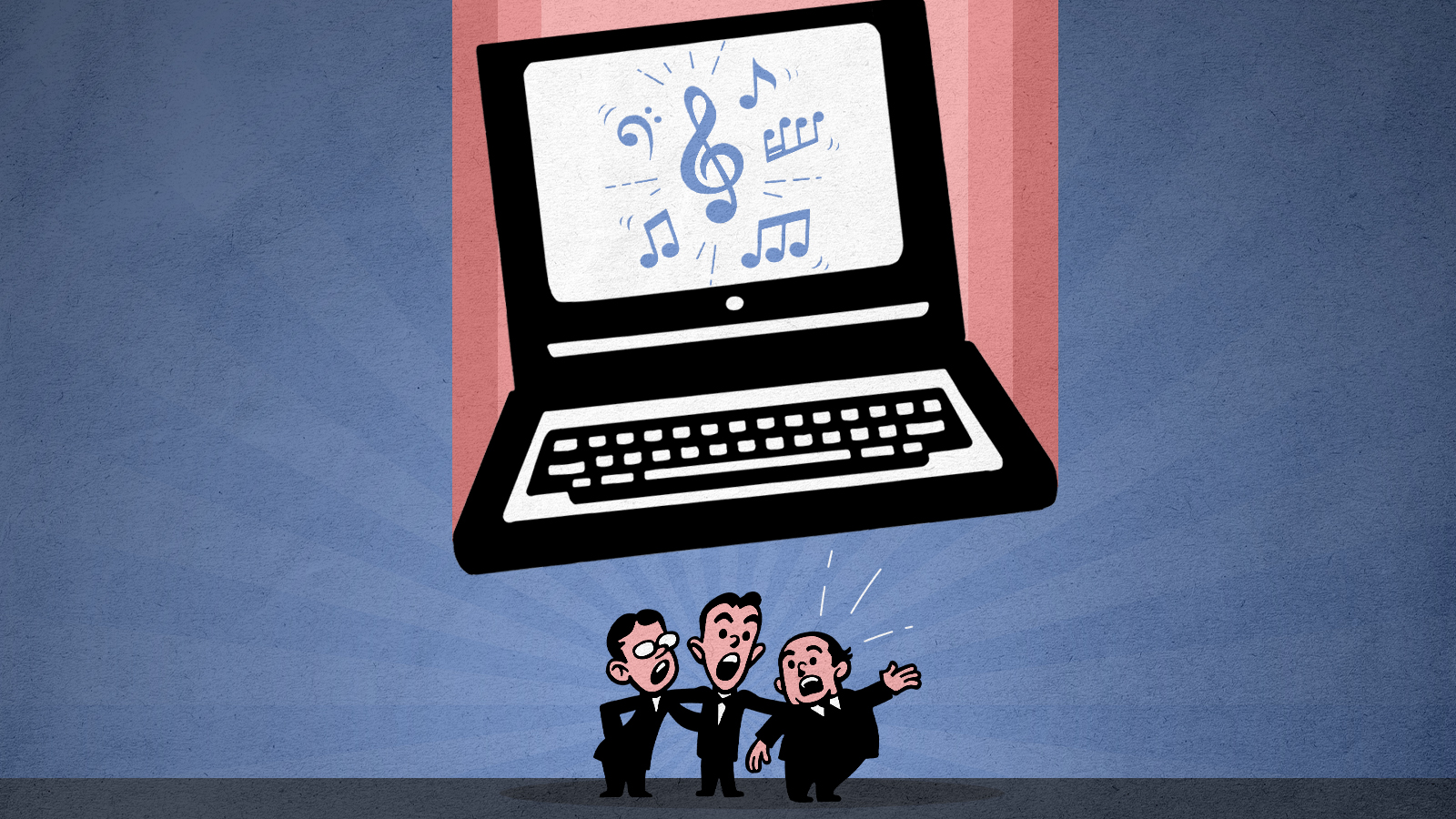How the algorithm killed the jingle
You don't need to remember brands if brands remember you


A free daily email with the biggest news stories of the day – and the best features from TheWeek.com
You are now subscribed
Your newsletter sign-up was successful
With the assuredness of a cultish chant and the unity of a national anthem, many of us wouldn't hesitate before singing the remainder of phrases like "Like a good neighbor…," "Ace is the place…," "1-8-7-7-Kars…," and so on. You can hear them in your head now, can't you? The jingle: capitalistic nursery rhymes played for us over and over again during television commercial breaks and radio spots.
The jingle was once a marvel of advertising ingenuity — a way to cement a brand into the minds of every unwitting watcher or listener in the country, relevant or not. Since the success of the radio broadcasting of a jingle for Wheaties in 1926, these short pithy tunes have been a favorite tool of advertisers to get products ingrained into the psyche of the consumer. We might not be able to remember how many members of Congress there are, but we do know the phone number to the Empire carpet company.
But a lot has changed since the days of hand-held radios and cable television. With e-commerce, digital analytics, data collection, and artificial intelligence, the world of advertising looks very different in 2022. And as brands continue to learn more and more about us, the less use they'll have for the jingle.
The Week
Escape your echo chamber. Get the facts behind the news, plus analysis from multiple perspectives.

Sign up for The Week's Free Newsletters
From our morning news briefing to a weekly Good News Newsletter, get the best of The Week delivered directly to your inbox.
From our morning news briefing to a weekly Good News Newsletter, get the best of The Week delivered directly to your inbox.
Sure, there are still some people who resignedly sit through commercials on cable TV and listen to the FM radio in their cars, but those numbers are dwindling, making it less cost-effective for ad agencies to spend the money and time crafting jingles that only a few will hear. Turbo-charged by the pandemic, the number of Americans who ended their traditional pay-TV service reached a record high in 2020, totaling 7 million American households. And as jingle-writer Steve Karmen, dubbed "King of the Jingle" by People magazine, said in a 2016 interview with NPR, "Unfortunately, jingle is an unacceptable word today. Jingle implies old. Jingle implies stodgy. Jingle implies not with it."
Today, capturing customers is no longer as quaint as crafting an earworm, but reliant instead on the culling of data on millions of users across the internet, personal devices, and even smart TVs. With interactive data from tech giants Facebook and Google — who together own almost 50 percent of the $200 billion digital advertising market in the U.S. — as well as details gathered from the likes of your credit card company or social media apps, marketing companies can craft ads based on your preferences. Many of these details are compiled into what Joel Cox, co-founder of advertising technology firm Strategus, calls "identity graphs." These help marketing companies better understand what, how, and when to try to sell you products.
And as streaming services gradually eclipse cable television, advertisers are increasingly investing in personalized commercials that appear on streaming platforms. Spending on streaming service and smart TV advertising grew by 40.6 percent from 2019 to 2020. As Consumer Reports notes, almost every streaming service that shows ads, including Hulu, Peacock, and YouTube TV, presents targeted commercials.
When we think about the extent — and success — of algorithmic personalization, it's hard not to discuss TikTok, now the most successful video app in the world. Through its unique algorithm, TikTok is able to keep you scrolling, drop you down into a rabbit hole you never knew you wanted to be in, and bring you back again and again. The app's algorithm, in its most simplistic version, largely relies on three pieces of data: likes, comments, and playtime.
A free daily email with the biggest news stories of the day – and the best features from TheWeek.com
Not all companies or advertisers rely on an algorithm quite like TikTok's, but most do know more about their average consumer than they ever did before. And since 31 percent of American adults are on the internet "almost constantly" and 85 percent are on at least once a day, there are few moments when we are not being confronted with targeted ads.
That raises the question: Do consumers even need to remember brands if the brands are remembering us? Do we need a jingle to recall the existence of a furniture store or clothing brand if we've already been identified as an interested consumer and get related ads on Instagram and Facebook for the company almost constantly?
In this era of personalization, it seems wasteful that the jingle for Kars4Kids was heard by many who did not own a car, were not planning to donate their car, or were not even of age to drive a car. Many individuals of a certain age grew up knowing that Nationwide was "on their side" far before they knew a thing about insurance companies, or even what insurance was.
Today, visit a website a few times or leave a couple of items in your online shopping cart, and you could be receiving promotional emails and texts from a brand for years. Not only are we more reliant on the internet to remind us, or even tell us what we like, need, or want, but we're also more inclined to move from one thing to the next at a faster pace. Today there is a shortening time frame for digital impact or relevancy, making it more necessary for brands to capture your attention while they can, rather than in the hopes of holding it for a lifetime.
Thus, the more companies know about you, the less you need to know about them. Folgers no longer needs you to sing, "Every morning waking up, it's Folgers in your cup." They already know what's in your cup.
Alex Reice is a producer at World 50. She is a recent alumna of Brown University, where she graduated magna cum laude with a degree in international relations. She lives in New York.
-
 6 of the world’s most accessible destinations
6 of the world’s most accessible destinationsThe Week Recommends Experience all of Berlin, Singapore and Sydney
-
 How the FCC’s ‘equal time’ rule works
How the FCC’s ‘equal time’ rule worksIn the Spotlight The law is at the heart of the Colbert-CBS conflict
-
 What is the endgame in the DHS shutdown?
What is the endgame in the DHS shutdown?Today’s Big Question Democrats want to rein in ICE’s immigration crackdown
-
 Buffett: The end of a golden era for Berkshire Hathaway
Buffett: The end of a golden era for Berkshire HathawayFeature After 60 years, the Oracle of Omaha retires
-
 Tariffs have American whiskey distillers on the rocks
Tariffs have American whiskey distillers on the rocksIn the Spotlight Jim Beam is the latest brand to feel the pain
-
 TikTok secures deal to remain in US
TikTok secures deal to remain in USSpeed Read ByteDance will form a US version of the popular video-sharing platform
-
 SiriusXM hopes a new Howard Stern deal can turn its fortunes around
SiriusXM hopes a new Howard Stern deal can turn its fortunes aroundThe Explainer The company has been steadily losing subscribers
-
 How will the Warner Bros. bidding war affect the entertainment industry?
How will the Warner Bros. bidding war affect the entertainment industry?Today’s Big Question Both Netflix and Paramount are trying to purchase the company
-
 Texas is trying to become America’s next financial hub
Texas is trying to become America’s next financial hubIn the Spotlight The Lone Star State could soon have three major stock exchanges
-
 US mints final penny after 232-year run
US mints final penny after 232-year runSpeed Read Production of the one-cent coin has ended
-
 How could worsening consumer sentiment affect the economy?
How could worsening consumer sentiment affect the economy?Today’s Big Question Sentiment dropped this month to a near-record low
